Chibi-Robo, and the Existential Crisis of Family
A celebration of communication and an ode to family
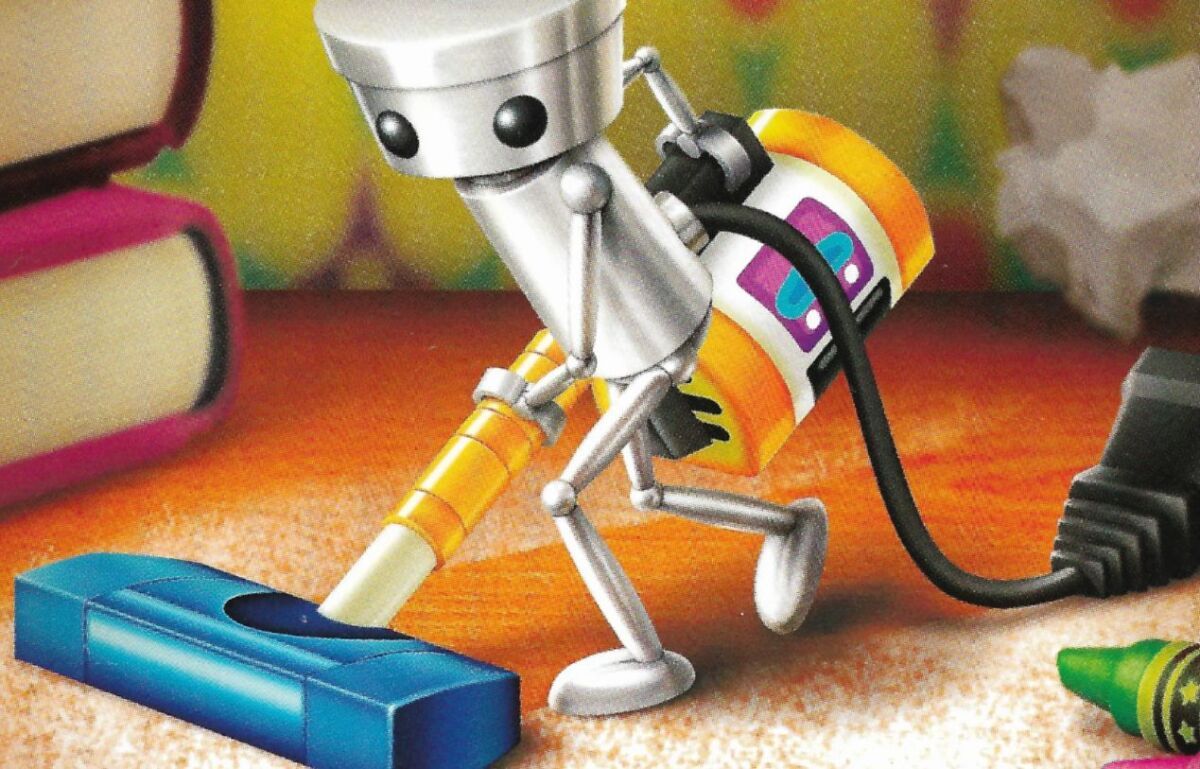
Toward the end of the Nintendo GameCube's life, Shigeru Miyamoto invested in a game whose unique premise garnered his infamous interest. Evolving from a cancelled point-and-click adventure, Chibi-Robo! was initially conceived as a command-based cursor game where the player would direct the eponymous robot to defend a family's home from a pair of burglars, Home Alone style.
Developed by Kenichi Nishi in conjunction with Skip LTD. and Bandai, Chibi-Robo! was published by Nintendo and spent four years in development. Miyamoto himself overhauled the production of Chibi-Robo! after falling in love with the character and noting the individual creativity of the game's premise. Like many other creatively-defining GameCube titles of the era such as Pikmin, Odama, and Super Monkey Ball, Chibi-Robo! Plug Into Adventure is recognizable by its unique and creative design elements.
A pastiche of Toy Story and 1960s Americana with platforming elements, Chibi-Robo! is a game that balances the repetition of household chores with exploration elements and family drama. Beneath the current of its cutesy style, strong art direction, and memorable characters is a surprisingly effective criticism of the heteronormative family unit, financial pains, and society.
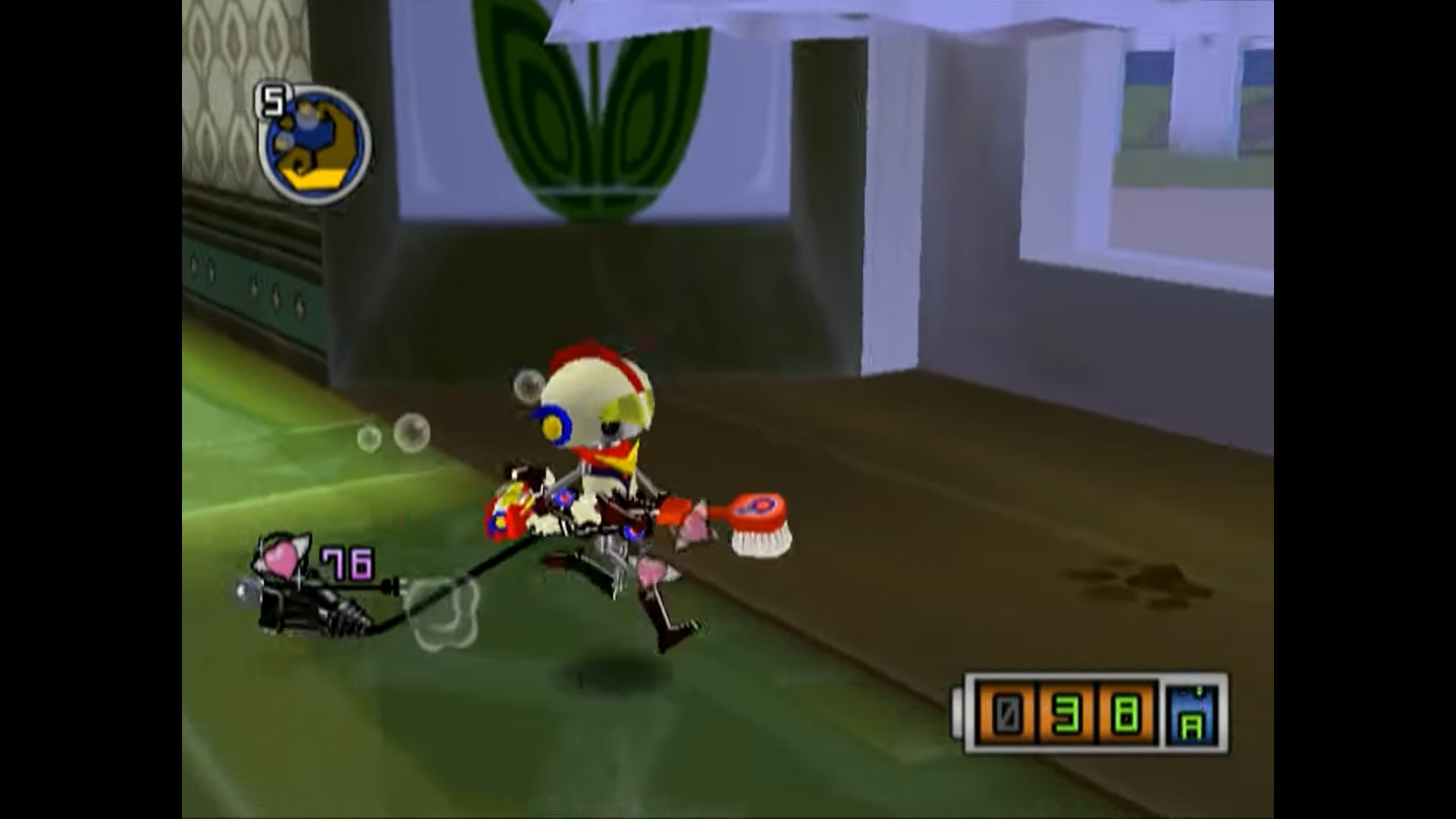
Form and Function
Kenichi Nishi, before directing Chibi-Robo, briefly worked for SquareSoft and has credits featured on a number of projects including Moon, Super Mario RPG, and Chrono Trigger. Nishi's creative endeavors prior to Chibi-Robo also include Incredible Crisis, where the player is instructed to play several mini-games that evoke the absurdities of the Japanese working class, and L.O.L.: Lack Of Love, a non-linear life-sim where the player must interact with an alien lifeform and craft a symbiotic relationship. Nishi was also close friends with acclaimed composer Ryuichi Sakamoto, who composed the soundtrack for L.O.L. and recently passed away. Many of the themes and ideas explored within Incredible Crisis and L.O.L. would go on to inspire the crux of Chibi-Robo.
On its surface, Chibi-Robo! is a game that plays against convention. It is presented as a platforming life sim where you play as the titular Chibi-Robo, a 10-centimeter tall cleaning robot. Chibi-Robo's narrative arcs melodrama with science fiction: alien visitors, time travel, and societal criticism fill out a family drama that's endearing and poignant.
The Sanderson family is infected with signs of a disintegrating household: the father is unemployed, the mother is stressed about bills and chores, and the daughter is withdrawn. While there is ample room within Chibi-Robo's narrative to explore the parents' separation and divorce, the game pivots toward salvation, using external trauma and danger as a motivator. What serves as the mediator between these three parties is the titular robot himself, Chibi, who navigates the family's woes while picking up garbage, washing away muddy footprints, and finding lost items.
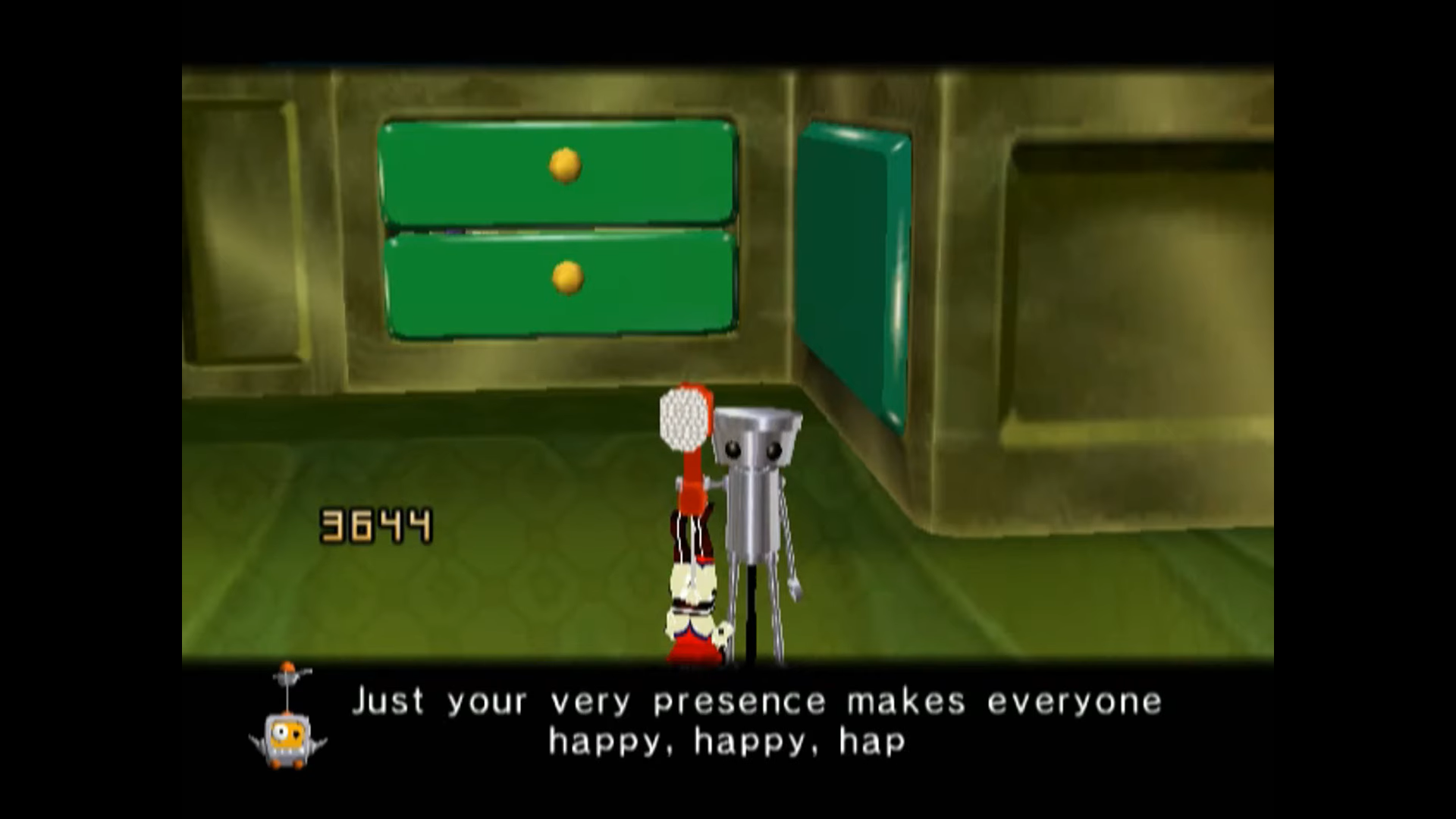
We're Here To Make You Happy
Gameplay in Chibi-Robo! is mostly a platforming affair, whereby you control Chibi as he runs, climbs, hovers, and explores the Sanderson household in his never-ending quest to conquer the family's infinite chores. While the gameplay is generally slow-paced, it's effectively spread out across the game's short run time, and the menial tasks contain so much variety that there's very little time for tedium even as you repeat actions like fighting Spydorz or scrubbing away muddy dog prints with a toothbrush.
The house itself is built like one continuous dungeon, with each room (the family room, the kitchen, bedrooms, etc...) representing zonal challenges with unique spaces to discover. Dangling cords, plants, and dresser drawers become climbing points, kitchen counters and living room tables become explorable surfaces, and more and more of the house opens up as Chibi is gifted new items from his hovering friend, Telly. Telly directs Chibi and the player through the game, and is a well-balanced mixture of curiosity and emotion against the completely silent (but emotive) Chibi-Robo. Chibi can also find various items throughout the house that help him serve the Sanderson family: a forgotten spoon becomes a shovel, a plunger allows Chibi to soak up water and other fluids for dispersal, and an abandoned mug serves as a temporary shield. Chibi-Robo's ingenuity is on full display as the house becomes more and more accessible, and every piece of the Sanderson home is a surmountable obstacle on the macro level.
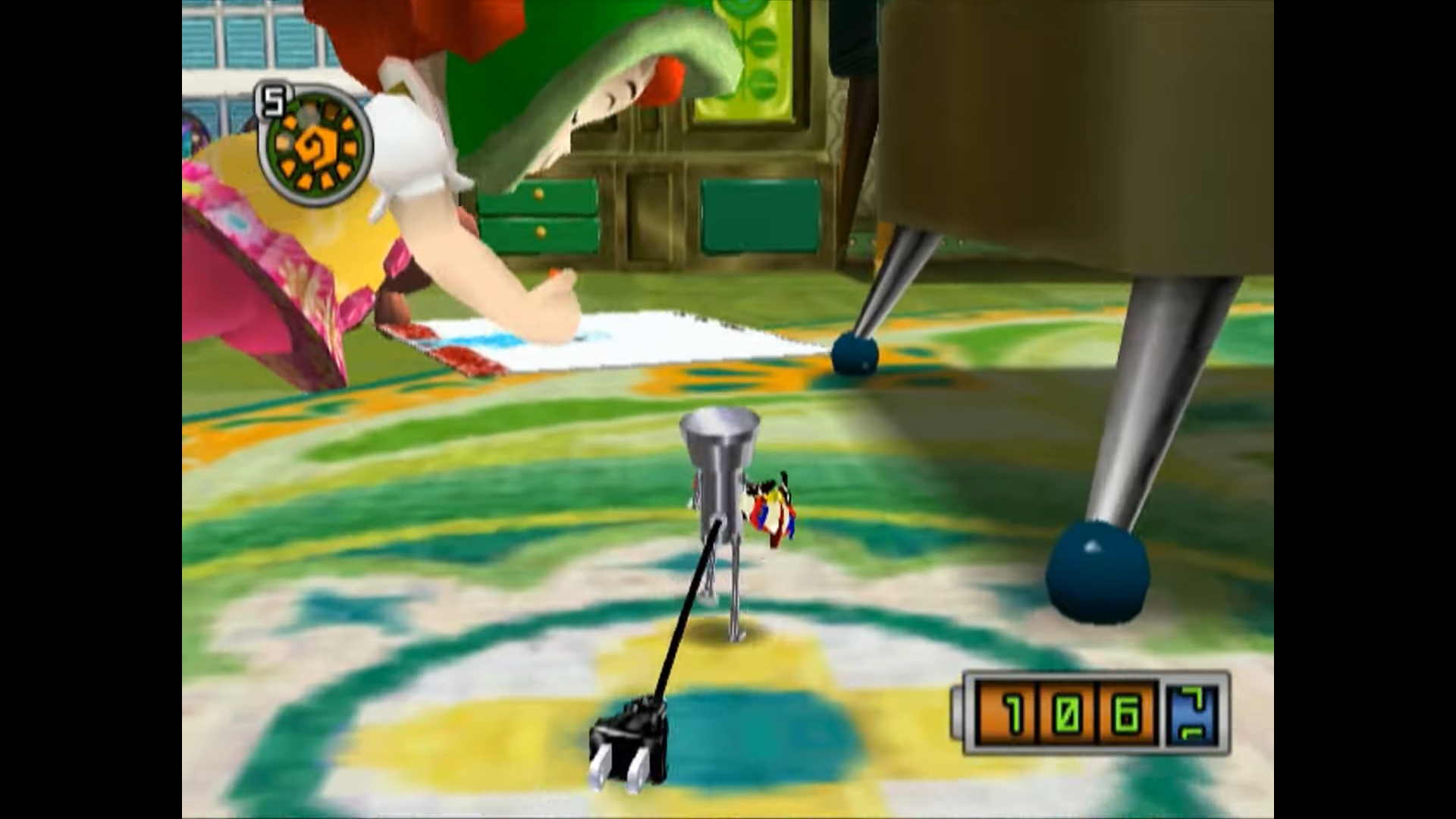
As Chibi accomplishes tasks and brightens up the Sanderson home, he's granted Happy Points by the sentient characters (including the family dog, Tao) that count toward a nebulous ranking where he will become the "Super Chibi-Robo." After every few levels, Telly awards Chibi with a prize directly from Citrusoft: a new battery. This gameplay loop, while unchanging, is designed with simplicity: earn Happy Points, increase Chibi's battery, explore further reaches of the Sanderson home without interruption. At any point Chibi can plug his power cord into any number of power outlets throughout the home, recharging his battery (and allowing the player to save). Paired with a day/night cycle that governs the behaviors of the household, Chibi-Robo! is endeavored by an addictive gameplay loop focused on rewarding the player in micro intervals.
A secondary resource determines what Chibi can by from his Citrusoft "Chibi-PC: "Moolah" is plentiful throughout the Sanderson household, both as a collectible item and as a reward alongside the delivery of Happy Points. As Chibi collects these resources (as well as a third resource introduced with the Spydorz enemies) he becomes more proficient at helping the Sandersons, and is unwittingly swept up into the drama of their lives.
Maid For The Family
While the Sandersons are not the only sentient hosts within the Sanderson household, they are the way by which the drama revolves. In true Toy Story style, many of toys within the Sanderson home have personalities that become active when they're not being directly supervised by the parents (they will often showcase their true natures in front of Jenny).
The game begins when George Sanderson purchases a Chibi-Robo for his daughter Jenny's 8th birthday. Jenny is an emotionally withdrawn child that wears a frog hat and constantly speaks in ribbits. Helen Sanderson, frustrated with her husband's spending habits, lack of a job, and cartoonishly adolescent personality, initially sees Chibi as just another unfortunate expense. As the Sanderson drama unfolds, Chibi and Telly commune with the toys throughout the house and the player slowly uncovers the secrets, emotional pains, and traumas that plague the well-meaning but dysfunctional Sandersons.
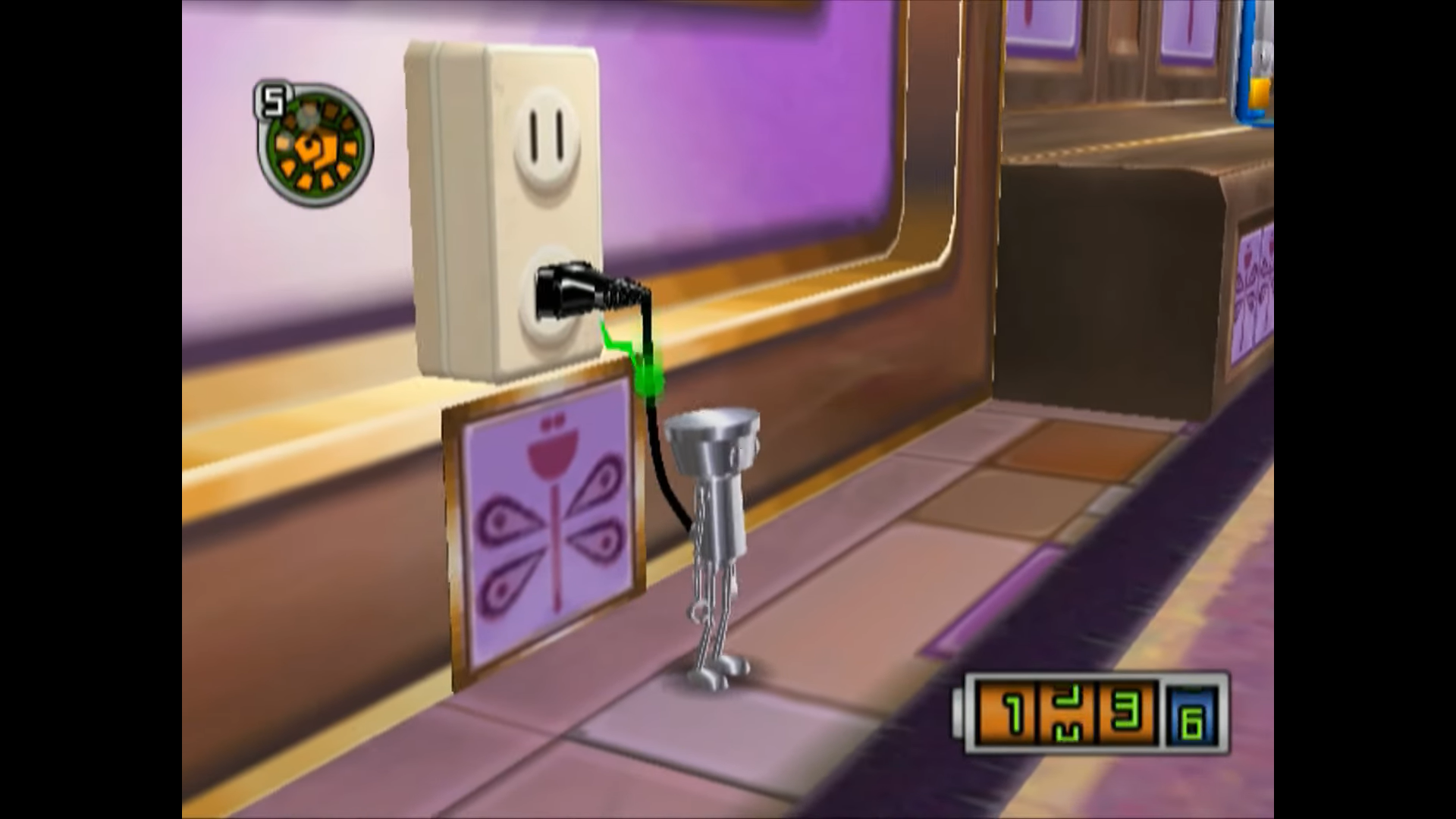
Characters like Space Hunter Drake Redcrest, Captain Plankbeard, Princess Pitts, Dinah, Mort, and others orbit the living cycle of the Sandersons and inhabit the home with their unique and well-defined personalities. It's through these personalities that Chibi and Telly are able to parse out what happened in the Sanderson's past that brought them to this point, and what they might do to bring them toward a brighter future.
It is made evident from the start that the majority of the family's problems stem from financial strain. It's not only that Mr. Sanderson has been unemployed for some time, but that his childish demeanor and lack of responsibility lead him to spending their Moolah on toys and games instead of bills. As Mrs. Sanderson continues to stress out over their piling debt, Jenny withdraws further into her frog personality and speaks mostly to the other toys, looking for emotional outlets and avenues that her oblivious parents cannot give her. While Chibi is gifted to Jenny, he is directed by Telly to help the entire family, and through his chores and good deeds he is able to subtly course-correct the Sandersons.
The family's strife is finally brought to a head when Mrs. Sanderson discovers yet another toy receipt, hidden by her husband. At this point, she locks herself in her room and refuses to do anything to help the family until he makes up for it. She threatens him with divorce and forces Mr. Sanderson to sleep outside their bedroom in a sleeping bag. Jenny is beside herself, burrowing deeper into her emotional trauma—and communes with an alien race that has been hovering outside the house for some time. Chibi speaks with the aliens and is granted the ability to return to the past, where he finds out about the family's initial relationship with the now-defunct Giga-Robo (abandoned to the basement since the family can no longer afford to charge his expensive battery) and is attacked by a legion of the strange menace called the Spydorz.
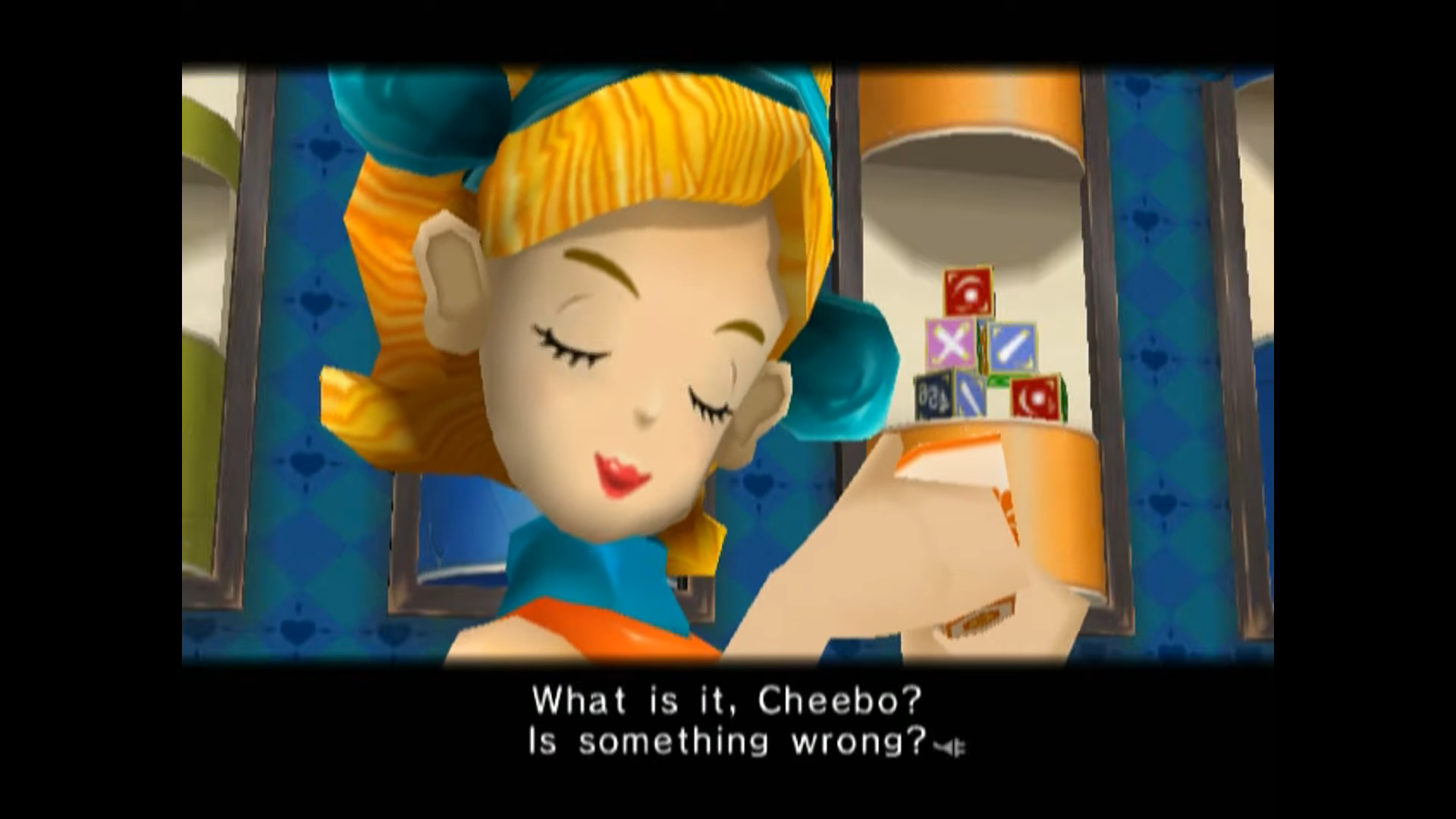
The truth is revealed as the family hunkers together on the other side of a Spydorz infestation, protected by Mr. Sanderson's quick thinking and Chibi-Robo's surprisingly aggressive technologies. George Sanderson quit his job because of a moral dilemma: he was the one that created and programmed the Spydorz, but the company he worked for reprogrammed them behind his back and transformed them into an unfortunate menace. Distraught to be a part of such a plot, Mr. Sanderson left his position at the company and devolved into the useless husband seen for most of the game. After Chibi protects the family and stamps out the temporary Spydorz menace, we learn the truth about Giga-Robo and the aliens: the Sanderson's Giga-Robo was aware of his taxing and expensive energy drain, and pleaded with the aliens to find a better resource that would not place such a burden on the family. After granting all of the toys in the household unique sentience, the aliens returned and granted all of the Robos in the world an infinite battery to blessedly reduce the out-of-control energy consumption.
Cute Before Catastrophe
What lies beneath the adorable surface of Chibi-Robo's minuscule adventure is a surprisingly apt story about love and strife, with plenty of subtle criticisms directed at many societal morays. Mrs. Sanderson's anxiety over bills and money is understandable enough, but it's the family's inability to adequately discuss their financial woes that strikes hard at anyone who has been in the same position. It's not only that the family is experiencing budgetary issues—we see again and again that there is a country-wide energy crisis that could have a profound effect on society as a whole.
There is a textured melancholy that threads through the whole of Chibi-Robo!, from the micro-stories that play out between the toys to the emotional depth at stake in each Sanderson family member. Initially the background conflict seems one-dimensional: marital spats, financial woes, and emotionally distraught children are nothing new to fiction. But casting these normalcies as the background against a cutesy platformer with life sim elements is what betrays the game's heart. Chibi-Robo becomes the catalyst for the family to figure out how to work together to overcome their strife, and even do their best against forces beyond their control. The Sandersons might not be able to directly affect the circumstances that are causing the nationwide energy crisis, and they can't stop the bills from piling up, but they can certainly band together to conquer their most intimate problems.
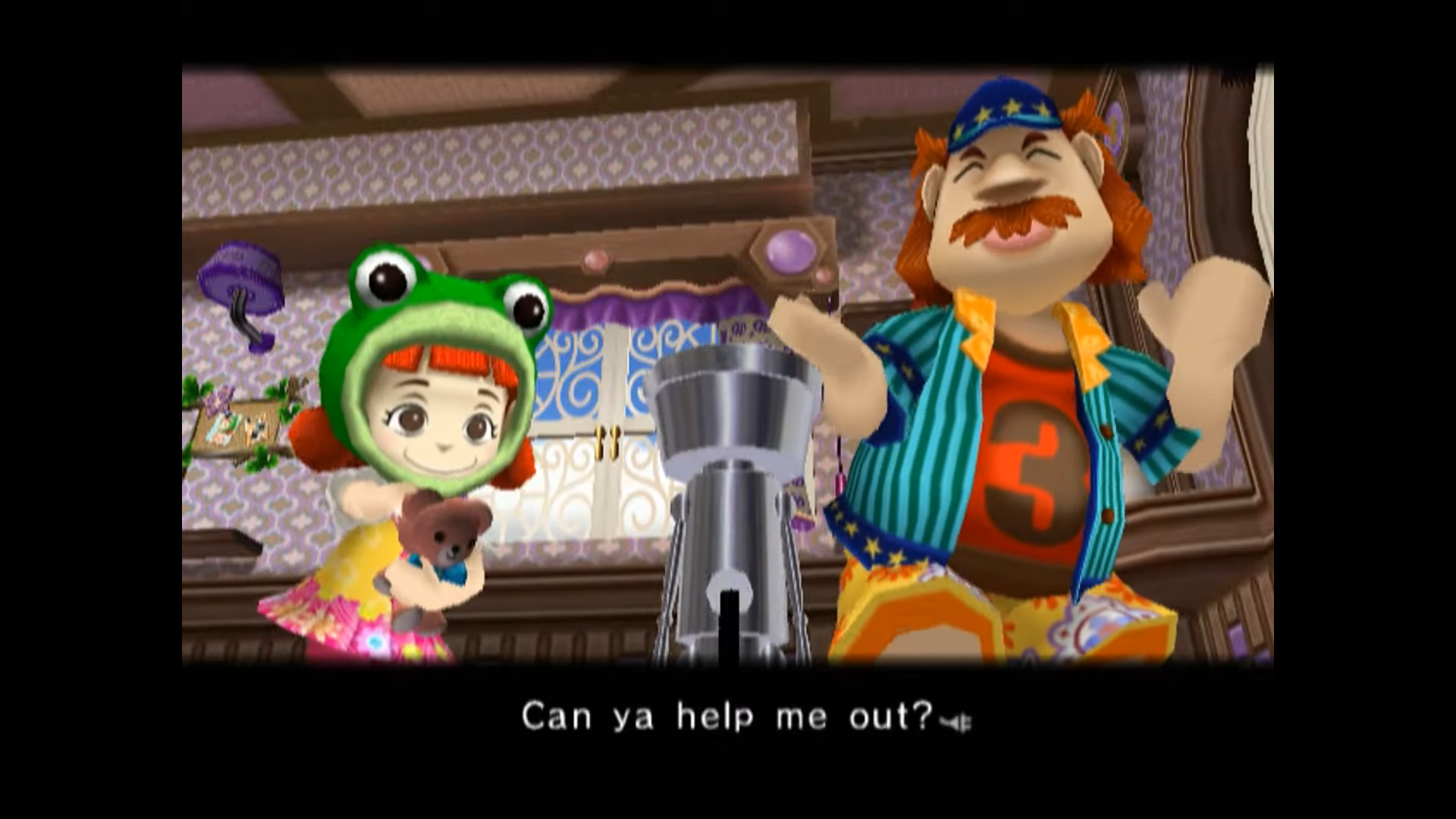
Video games are, more often than not, a form of escapism. We use video games to rest and relax and hide away from the world. Even games that contain profound friction, such as horror titles or games with strong emotional or socio-political elements, feel like a break from the real world because we can briefly focus on problems that are not our own. As a child of divorce, I spent much of my teen years absorbed in video games not only because I found them entertaining but because they allowed my mind some much-needed respite from my parents' constant sniping. My brother and I could disappear into Final Fantasy IX for hours, much to my parents' chagrin. They were either unwilling, or incapable, to see the positive effects of this escapism. Video games have since evolved into one of my major coping mechanisms, and continue to be a sort of therapy that protects me against the cruelty and friction of the real world.
In Chibi-Robo!, Jenny dons her frog hat and plays with the sentient toys in her room because, as an 8-year-old child, she cannot bear the emotional pain of her parents' arguments. Jenny is consistently tossed between their problems, a scapegoat of an adolescent father and an anxious mother. When Jenny finally breaks, she speaks through her toys to confess her woes to Chibi, while continuing to speak in rabbits at all other times. It's through Jenny that we initially make contact with the aliens, because their signal comes through during a bout of her childhood insomnia. While the parents might be worried over their very adult problems, they allow their daughter to wither unchecked, the strife of their separation heaviest on their child. This is an all too common aspect of divorced and separated parents, and Chibi-Robo! showcases the selfishness associated with embittered adults and how that ultimately does the most damage on the innocent child.
Chibi's help is incidental. While the diminutive robot receives Happy Points for his good deeds, his actions only allow the family to gravitate back toward one another. Chibi is the binding element that allows the Sanderson family to heal, even when he might indirectly lead to their friction (Chibi is the one that brings Mr. Sanderson's toy receipt to Mrs. Sanderson, for instance). While his actions as a choring robot cannot be labeled as good or bad, he can only serve at the behest of the family. Unlike with traditional video game narratives, the drama unfolds around Chibi, and as the player you are a curio that gently nudges the Sandersons toward their most important interactions.
Cleaning Through Controversy
At the time of this release, Chibi-Robo! was praised for its emotional core and its pleasant coverage of controversial topics. Society continues to treat divorce like a taboo, its coverage and depiction often lacking the subtlety required to cover something so rife with intimate pains. Chibi-Robo's existential explorations do not delve deep into woebegotten philosophies, but are instead gently revealed to the player in a way that's familiar and touching. The cyclical rhythm generated by the chores, activities, and actions of Chibi-Robo! might be framed by dysfunctional interactions, but the crisis that unfolds is centralized by deeply human feelings.
Chibi-Robo! is a game of near-constant discovery, whether it's scouring bedrooms and kitchens like mountains or finding that exact right item to progress an important relationship. By centering itself on menial labor made fun, Chibi-Robo! is able to define itself in a very curious way. It explores the deeply impactful connections between inanimate objects and people, while also granting is a flexible snapshot into a life made intensely private by strife. The Sandersons feel like any family trying to weather the turbulations of life, and Chibi becomes much more than just a robotic maid. It's a game with subtle and symbolic explorations into the existential contrast of those that live under the same roof; it's also a game about an endearingly adorable robot. Chibi-Robo! is a celebration of communication, and an ode to family.
